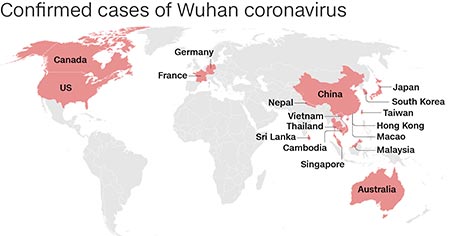A coronavirus outbreak has been sweeping through the Chinese city of Wuhan. More than 6000 people have been reported infected with the virus in China alone while the death toll reached 132 by Wednesday, January 29, 2020.
The virus that is believed to have originated in Wuhan in late December 2019 is becoming uncontrollable. In December, a pneumonia outbreak was reported in Wuhan, China, and by 31st December, the outbreak was traced to a novel strain of coronavirus.
Cases of coronavirus infections have also been reported in as far as the United States to Chinese neighbors Thailand, Taiwan, Macau, Singapore, Japan, South Korea, Malaysia, Vietnam, and Nepal. Moreover, a few cases have also been reported in France, Canada, and Australia.
 Coronavirus affected areas include China, and neighboring nations SOURCE: CNN
Coronavirus affected areas include China, and neighboring nations SOURCE: CNN With spreading infections, hospitals in Wuhan city struggled to find places for the new coming patients. In such, China announced on Friday, 24th, that it would build a hospital with around 1,000 beds within a week. The incredibly swift hospital set up is no new in China as it had set up a similar hospital in Beijing in 2003 to tackle the SARS virus outbreak.
Although late, the Chinese authorities suddenly got into action in late January, announcing a draconian lockdown of Wuhan and 17 other cities in the surrounding Hubei province, corralling more than 56 million people. While many consider this move to be positive, some critics concern the ma s s quarantine has been an aggressive response that's far from perfect. They say a similar practice had led to political, financial and social consequences in the past.
Professor and director of the Center for the History of Medicine at the University of Michigan, Howard Markel told CNN,
I've never seen an entire city 11.4 million people cordoned off like that. I thought I'd seen everything.
What Is Coronavirus?
Coronavirus is a group of viruses capable of causing illness in mammals and birds. The virus was originally discovered in the 1960s. At the time, two types of viruses from the nasal cavities of human patients with common cold were found and were named subsequently human coronavirus 229E and human coronavirus OC43.
Other members of the family have since been discovered, such as SARS-CoV (in 2003), HCoV NL63 (in 2004), HKU1 (in 2005), MERS-CoV (in 2012) and 2019-nCoV in 2019. Most of the viruses are responsible for causing severe respiratory tract infections.
 CAPTION: Structure of Coronavirus 2019-nCoV SOURCE: MichiganRadio
CAPTION: Structure of Coronavirus 2019-nCoV SOURCE: MichiganRadio Coronavirus falls under the Orthocoronavirinae subfamily in the Coronaviridae family, in Nidovirales order. Its name was derived from the Latin word "corona," meaning crown or halo, given after its characteristic appearance.
Symptoms of Coronavirus Infection
The symptoms of coronavirus infections depend on how severe the infection is. A mild to moderate upper-respiratory infection includes the symptoms:
- Runny Nose
- Headache
- Cough
- Sore Throat
- Fever
 Symptoms of coronavirus 2019-nCoV SOURCE: The Sun
Symptoms of coronavirus 2019-nCoV SOURCE: The Sun On the other side, some severe infections might lead to severe symptoms as:
- High fever
- Cough with mucus
- Breathing difficulties/shortness of breath
- Chest pain or tightness during breathing
If undiagnosed early, the infections may turn into pneumonia and bronchitis. As per the reports, severe infections are common in people with a weak immune system, as well as people having heart and lung diseases.
How Can We Prevent Coronavirus Infection?
The invention of vaccines against coronavirus may take years as it has just been discovered. However, the risk of catching or spreading coronavirus infection can be reduced. The following are the recommended safety measures:
- Avoid close contact with the people with a common cold or who are sick.
- Clean and disinfect surfaces that you touch frequently
- Cover mouth and nose while sneezing or coughing and wash your hands properly.
- Avoid touching your face, nose or mouth with unwashed hands.
Indian Doctor Claims to Have Found Cure for Coronavirus
While several medical teams from across the globe have been struggling to invent a cure for the newly discovered coronavirus, a doctor in India has claimed to have found it. According to GulfNews, a Siddha doctor from Chennai, Tamil Nadu, India formulated a herbal medicine that can cure coronavirus infection.
Speaking to ANI, Dr. Thanikasalam Veni of Rathna Siddha Hospital said,
We have formulated medicine from an extract of herbs. It is very effective to cure any type of viral fever. Coronavirus has no medicine. In China's Wuhan where Coronavirus has claimed over 100 lives, experts have no idea how to cure the disease. Our herbal extract medicine is used to treat dengue, multi-organ fever and acute liver fever.
The doctor continued,
We want to tell the World Health Organization (WHO) and the Chinese government that our medicine is very effective in treating multi-organ failure in corona fever condition.
Australian Scientists Replicated New Coronavirus
While hundreds of scientists are searching for the cure of coronavirus, a group of Australian scientists have successfully replicated the deadly coronavirus. The scientists have claimed the invention would be a "game-changer" in the fight against a deadly epidemic. On Wednesday, January 29, the Doherty Institute in Melbourne announced they had successfully replicated the virus (first outside Asia). The laboratory head Julian Druce said,
Having the real virus means we now have the ability to actually validate and verify all test methods, and compare their sensitiveness and specificities. It will be a game-changer for diagnosis.
Previously, China had successfully replicated the virus, however, they haven't shared the virus itself with the laboratories worldwide. Contrary to them, the Australian laboratory will now share the virus via WHO. Meanwhile, WHO announced Beijing had agreed to allow a team of international experts to work with the Chinese counterparts.






